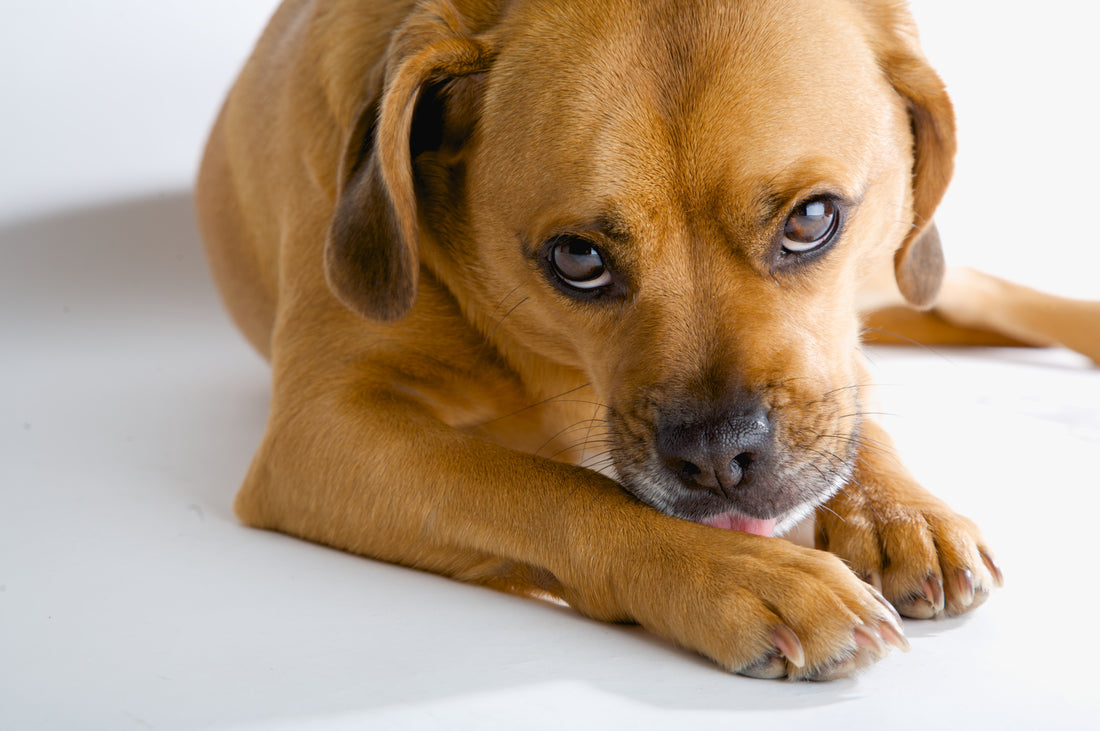"My 10 year old Shi-poo was put on Prednisone. After a few weeks she seemed improved, so I took her off prednisone but in about 3-4 days her symptoms came right back and I had to put her back on the meds. She is driving me crazy on this medication, constantly begging for food and acting like a maniac!! She is not like my little dog that I love, what can I do to help her?? HELP!!"
The story above is a common example of what we hear from pet owners dealing with a pet on prednisone. The side effects of prednisone for dogs can range from mild to severe, but in any case, the medication has many undesirable side effects.
Common Side Effects of Prednisone
- Excessive Thirst and Hunger
- Diarrhea and/or Vomiting
- Joint inflammation
- Anxious behavior or other behavioral changes
How to Handle the Side Effects of Prednisone
LIMIT PREDNISONE
The best way to limit the side effects of prednisone for your dog is to reduce the duration of the medication, however, this is not always possible. We discuss this idea more below.
PROVIDE NUTRITIONAL SUPPORT
With nutritional support, the side effects of prednisone can be reduced during therapy, and in some cases, you may be able to get your dog off prednisone altogether. We recommend a nutritional strategy that involves supporting the gut and discouraging toxin and yeast build up. Supply your dog with a good probiotic and digestive enzyme supplement to support the gut, and remove grains from the diet. If possible, feed raw.
HANDLING THE BEHAVIORAL CHANGES
Side effects of prednisone can include the following behavioral changes:
- Agression
- Anxiety
- Restlessness
Your dog is not feeling "right" while on prednisone. He knows his body is in a state of imbalance and this results in behavioral changes which can be almost unbearable. Counteract the side effects of prednisone with nutrition and a few adjustments during the day which we've listed below.

HOW TO HANDLE EXCESSIVE THIRST AND HUNGER
For thirsty dogs, make sure there is fresh water accessible for your dog, that's easy. But for a dog that acts like he's starving, it can be difficult to keep him satisfied. If you feed your dog a dry kibble, the thirst may be even more emphasized, so try to feed a raw diet or provide extra water in the food.
For extra hungry dogs, rest assured your dog isn't really more hungry, or needing extra food during this time. Allowing your dog to chew something safe and healthy is a good way to handle both the behavioral side effects and excessive hunger that comes with prednisone. Also, a few healthy snacks throughout the day can help or breaking up his feedings into a few extra meals is a good idea.
DIARRHEA, VOMITING, AND STOMACH ISSUES
Prednisone, like other prescription medications, can strip the gut of healthy flora. The result expresses itself as a dissatisfied feeling for your dog, and if he experiences diarrhea or vomiting, that's even worse.
If possible, boost your dog's gut health with probiotics for one week prior to starting prednisone therapy. If your dog is already on prednisone and experiencing the side effects, replace the healthy bacteria as soon as possible. Probiotic Miracle®, in daily therapeutic doses has been very effective for dogs. Supply the probiotics twice per day, or at each meal, rather than just once.
How To Reduce The Need For Prednisone
REDUCE OR ELIMINATE ALLERGENS
Allergens can be caused by diet, and there are also inhalant allergies. Identify the allergen and eliminate it.
SUPPORT THE BODY WITH NUTRITION
Sometimes prednisone is a necessary medication, but in many cases, the need for prednisone can be avoided with some extra care in nutrition. While prednisone may offer an immediate relief for your dog, the side effects cause another array of problems. Nutritional treatment may take longer to improve the underlying condition of your dog, but, the results are long lasting with no negative side effects.
Below is a full list of support remedies to help your dog avoid needing prednisone therapy. Allow 8 weeks for the full effect of nutritional therapy to stabilize the body.
- Probiotics: Support healthy immune function via the gut. We believe the most important supplement for you pet is probiotics. (Probiotic Miracle®)
- Enzymes: A quality plant-sourced multi-enzyme relieves eases stress on the body and helps breakdown toxin buildup. Enzymes are very effective at breaking down irritants like yeast, fungi, and bacteria, and, in effect reducing the need for prednisone. (Enzyme Miracle®)
- Fish Oil: The essential fatty acids in a pure fish oil, like Celavin† provides a wide range of wellness benefits including normalizing inflammation, as well as improved cardiovascular, brain, and neural health. For a complete list of benefits, read: Essential Nutrient Your Pet May Be Missing.
- Nutrients: Supply antioxidant compounds, bioflavonoids, vitamins C and E, selenium, and sulfur-containing amino acids, which are needed to protect the body from the tremendous increase in free radicals that occurs during an inflammatory response. (Dermix™)
Related: Understanding Probiotics for Pets: CFU, Species, and Dosage Explained
The four nutritional supplements listed above are what we consider a "Must Have" for basic dog wellness as they support foundational immune and systemic health. By adding these supplements to your dog's diet, you ensure more efficient bodily functions without any of the negative side effects that come from prednisone.
Product Snapshot: Nutritional Supplement "Must Haves"
Follow the link below for a list of must-haves when your dog is on prednisone, or to help avoid prednisone altogether: Prednisone for Dogs Alternatives




8 comments
My dog is on prednisolone for an ear allergy but today he’s fur smells of fish? Is it connected?
My dog Lacey was given a steroid injection on Friday for hot spots at a vet my friend goes to , she has had loose bark stools that she never had before the shot, what can I do or will it go away, the vet said the injection would last a week.
To the person who has a dog being aggressive. My 13 year old dog recently completed a course of steroids.Councidentalky I have a daughter with medical problems requiring lifetime, 20 yes so far of steroids and I know how they effect her. Steroids can cause aggression and really hungry. I moderately gave my dog cbd treats I bought Lazarus Naturals treats with cbd at a regular store. These are not homemade. These definitely improved his mood while on steroids; although he wasn’t agressive. Since he’s been off I’ve been giving my dog probiotucs and chicken, eggs, a little beef, and just started dried salmon treats and even a bitof fresh salmon today that must be cooked extremely well to kill a particular bacteria. I feel like his body is trying to rebalance itself. I’ve also started slowly increasing walks as the steroids broke down his muscles and he was tripping.
HI, my dog is almost 3 and she was given prednisone for an allergic dermatic reaction to her underside. She has one more dose left and has tapered off the med. She is having aggressive behaviors. I was told this will not be tolerated where I live and she will need to go if it continues (especially if she is this way to residents). I keep a muzzle on her when she is out. I will try fish oil and probiotics. Will a small dose of Benadryl help to calm her?
Like me, prednisone is keeping your dog alive. My advice for those in our situation (which this piece didn’t address) is to adjust the dose so that your dog is getting the smallest amount to deal with the symptoms. YWe can l know this (through trail and error) because we are with them everyday while the vet (who have you the same generic dosing instructions for decades) or/and sites like this are not. Minimizing dosage minimizes side effects and less prednisone will contribute to more days with your dog. Effects and side effects of Pred shift over time, not sure anyone knows why. Beyond that I would just not worry about what your dog’s fur looks like and take joy in watching her enjoy life even if it’s only for a few minutes every day.